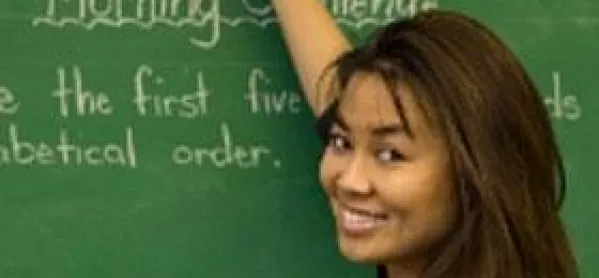More active role must be encouraged

Chartered teachers should be leading continuing professional development in new approaches to teaching under A Curriculum for Excellence, says Fiona Hyslop.
The Education Secretary’s comments at the official launch of the Association of Chartered Teachers (ACTS) suggested they should be taking a more active leadership role in schools. But the former head of the General Teaching Council for Scotland reinforced the view that their role lay firmly in the classroom. “You represent something that is quite different in Scottish education and you represent a totally different concept,” said Matthew MacIver, recently-retired chief executive of the GTCS.
“It is so utterly professional; it is so unambiguously attractive and so critically important to the education of our children; it actually acknowledges the worth of the classroom teacher.”
Ms Hyslop said the time had come to assess the impact of the chartered teacher scheme on Scottish education. She had, therefore, asked HMIE to review its impact. Initial findings should be available this summer and a fuller analysis next year.
“Curriculum for Excellence will not come about through top-down direction,” she said. “It is the creativity, ingenuity and confidence of teachers across Scotland that can make it happen, and chartered teachers can help the professional dialogue that is fundamental to tackling the challenge and ensuring success.”
Mr MacIver, who was described at the event as the “midwife” of the CT programme, said he did not believe the concept was geared towards leadership. “A career in leadership does not fit well within the philosophy. Can you change the philosophy of the chartered teacher scheme? Absolutely not”, he said.
“The Standard for Chartered Teacher meets a real professional need and a Standard for Leadership meets another one. I have always felt there was a gap in the framework. The Standard for Chartered Teacher should be totally different from that for leadership.”
Mr MacIver paid tribute to the Scottish Government and its predecessor for their willingness to fund the CT programme from the public purse. But the provision of public funding also meant there had to be public accountability. “I think a chartered teacher has a specific role to play in terms of a school - that still has to be addressed,” he said.
Walter Humes, associate dean of the University of the West of Scotland, said chartered teachers had come a long way in recent years. Headteachers now realised they represented an “enormous resource” which could be mobilised, and even staffroom cynics had stopped sniping. He urged the association to develop an independent voice and not to become part of the “usual charmed circle” of the educational establishment.
“It may be, that in this honeymoon period, you may be clasped to the warm bosom of the Scottish education establishment. In my limited experience, warm bosoms should be mistrusted,” Professor Humes warned. “Don’t become too chummy with the educational establishment; maintain an element of distance and retain your integrity.”
`One of the joys of my claim was the time I took to talk to the pupils’
Becoming a chartered teacher was not about the money - although the pay rise was appreciated, Clare Bryden (pictured), an English teacher at Earlston High in the Borders, told fellow chartered teachers at the launch of the Scotland Association of Chartered Teachers.
In practical terms, gaining CT status had meant membership of “lots of important-sounding groups” and she genuinely felt a valued member of the learning and teaching community in the Borders.
Most important had been a fundamental change in her vision of the importance of teachers coming together as a community.
“In the past, I’ve always been someone who’d prefer to do things on her own with no outside interference. I quite liked the very old-fashioned idea that I could just hide away in my classroom with the kids and pop out for cups of tea and a bit of a gossip every now and again, and I fiercely guarded my teaching `secrets’ as if they were some magic potion,” she confessed.
Looking at how she taught 10 or even five years ago, the experience she now offered to pupils was “infinitely superior”, she believed. “One of the joys of preparing my claim was the time I took to talk to the pupils and get a real and honest assessment of how they found my teaching.
“Another joy was the moment when a light bulb went on in my head and I realised that I’d been stuck in a way of viewing students as if they were a homogeneous group, rather than a collection of individuals who all thought and learned differently.”
After examining different styles of learning for S1-2 pupils, she was struck by the words of the British educational psychologist Noel Entwistle: “It is as if we are continuing to hit the knuckles of the right-brained thinker with the rules of logical conformity, instead of producing a choice between modes and styles of thinking within the formal education system”.
The realisation that this concept should be applied to all pupils had had “a massive impact” on the way she approached teaching her Higher classes and the way they reacted to the course.
“I was actually able to demonstrate that this change in awareness and metacognition had taken place,” said Mrs Bryden. “I have also had more confidence in sharing this with other teachers both within my department and across the region.”
Photograph: ACTSLloyd Smith.
Keep reading for just £1 per month
You've reached your limit of free articles this month. Subscribe for £1 per month for three months and get:
- Unlimited access to all Tes magazine content
- Exclusive subscriber-only stories
- Award-winning email newsletters